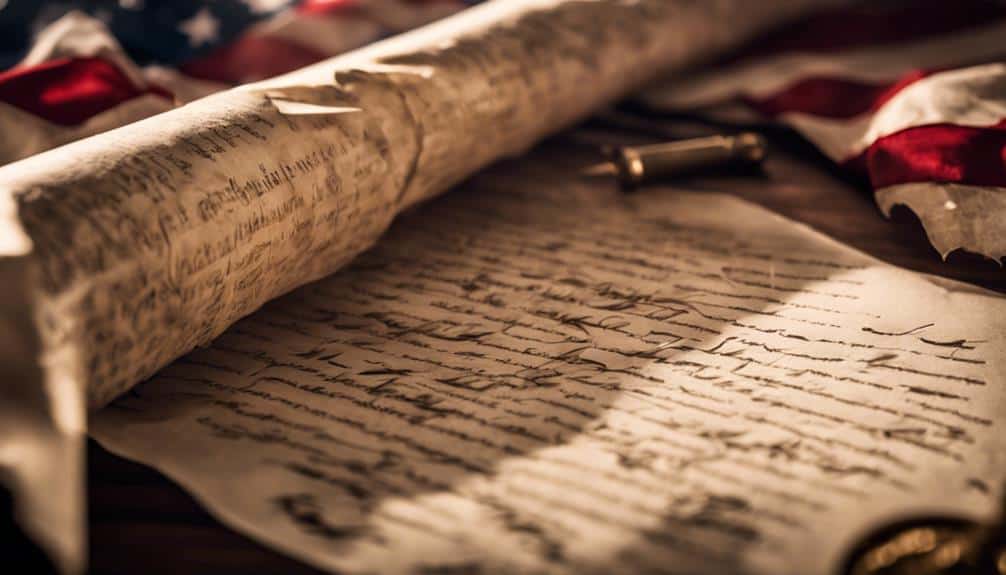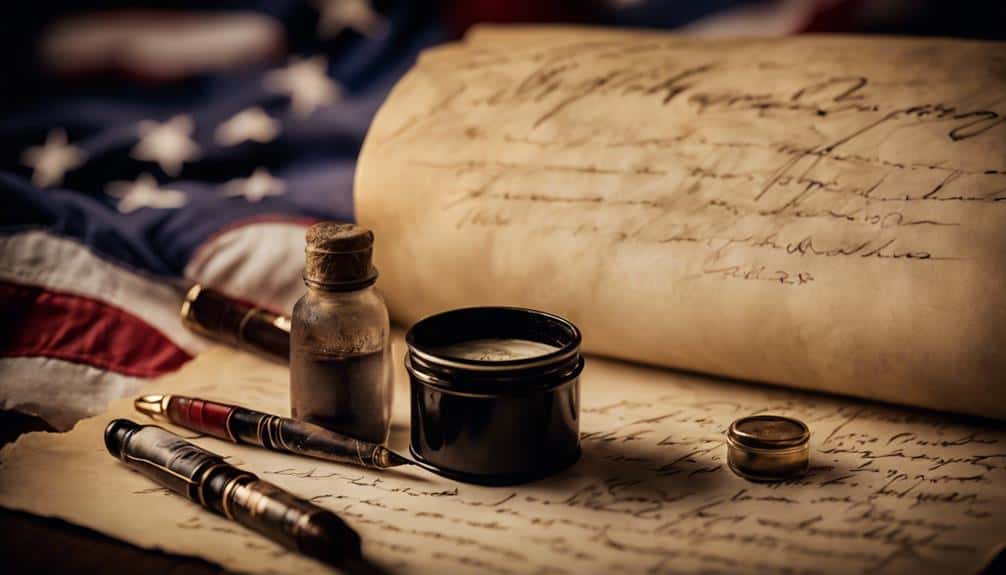Drafted by Thomas Jefferson in 1776, the Declaration of Independence not only unified the American colonies against British rule but also provided a powerful philosophical justification for their cause, sparking a revolutionary movement.
Discover how this pivotal document influenced not just politics but also military strategies, future policies, and global aspirations for freedom and self-governance.
Historical Context

To understand the significance of the Declaration of Independence, it's essential to explore the historical context of colonial America in the mid-18th century. By this time, the American colonies were under British rule, experiencing increasing discontent due to oppressive policies and lack of representation in the British Parliament.
The colonies' frustration boiled over with events like the Stamp Act of 1765 and the Boston Tea Party in 1773, which exemplified their resistance against unjust taxation and governance. In this turbulent environment, Thomas Jefferson emerged as a pivotal figure. Tasked by the Continental Congress, he drafted the Declaration of Independence in June 1776.
Within just 17 days, Jefferson encapsulated the colonies' grievances and articulated a vision of self-governance and individual rights. His eloquent prose not only justified the colonies' separation from Britain but also laid the philosophical groundwork for a new nation.
When Congress officially adopted the Declaration on July 4, 1776, it wasn't merely a symbolic act. It marked the beginning of a revolutionary war and the birth of a nation rooted in the principles of liberty and democracy. This document remains a cornerstone of American history, profoundly influencing the trajectory of the United States.
Lincoln's Bold Move

While the Declaration of Independence set the foundation for American liberty, President Lincoln's issuance of the Emancipation Proclamation in 1863 marked a pivotal shift in the nation's battle for human rights. By declaring all slaves in rebellion states free, Lincoln altered the course of the Civil War and the nation's trajectory. This bold move didn't only aim to preserve the Union; it redefined the war's purpose to include the moral imperative of ending slavery.
The Emancipation Proclamation had far-reaching implications. Over 200,000 black slaves joined the Union forces, bolstering the North's manpower and adding moral weight to the Union cause. This historic document effectively transformed the Civil War into a crusade for human freedom, setting the stage for societal changes that would follow.
Lincoln's strategic timing and framing of the Emancipation Proclamation were essential. By linking the abolition of slavery to the war effort, he secured broader support for the Union cause and weakened the Confederacy both morally and economically. Moreover, this proclamation paved the way for the eventual passage of the 13th Amendment, which abolished slavery entirely.
Lincoln's bold decision fundamentally changed American history, steering the nation towards a future where human rights were a central tenet.
Immediate Impact

You can't ignore the immediate impact of the Declaration of Independence; it sparked a revolutionary movement by uniting the colonies in their resolve against British rule. Its principles inspired global independence movements, influencing nations to seek self-determination.
Sparked Revolutionary Movement
The Declaration of Independence, a defining manifesto, immediately galvanized the American colonies into a unified revolutionary movement against British oppression. By proclaiming the colonies' separation from British rule, it provided a clear and compelling rationale for American independence. Accepted by Congress on July 4, 1776, this document marked the official birth of a new nation, forever known as Independence Day.
Thomas Jefferson, tasked with drafting the Declaration, encapsulated the aspirations of the colonies in just 17 days. His eloquent and persuasive writing articulated the principles of liberty and self-governance, laying the groundwork for the colonies' collective resolve to break free from British tyranny. The Declaration's immediate impact was profound, as it transformed widespread discontent into a focused and organized revolutionary movement.
You can see how the Declaration of Independence not only laid out the grievances against the British Crown but also united the colonies under a shared vision of freedom and equality. It became a rallying point, motivating colonists to take up arms and fight for their rights. This document remains a cornerstone of American history, symbolizing the enduring quest for liberty and justice.
Inspired Global Independence
By articulating a universal message of self-determination and human rights, the Declaration of Independence immediately resonated with oppressed populations around the globe, sparking a wave of revolutionary movements. The document, proclaiming the American colonies' separation from British rule, wasn't just a national manifesto—it became a symbol of global independence. People worldwide saw its principles as a call to challenge their own oppressive regimes.
The Declaration's assertion that 'all men are created equal' and endowed with 'unalienable Rights' like 'Life, Liberty, and the pursuit of Happiness' provided a powerful framework. This framework inspired many to seek similar freedoms. For instance, the French Revolution was notably influenced by the American experience, leading to the Declaration of the Rights of Man and of the Citizen in 1789.
Furthermore, colonies in Latin America, Asia, and Africa looked at the American example as a beacon of hope, fueling their own quests for independence. The Declaration of Independence, drafted by Thomas Jefferson in just 17 days, served as a catalyst for global change.
Its immediate impact was felt as various nations began to challenge colonial powers, laying the groundwork for the eventual decolonization that would sweep the world.
Unified Colonies' Resolve
Uniting the American colonies in a collective determination to break free from British rule, the Declaration of Independence fundamentally altered the course of history. This pivotal document crystallized the colonies' resolve by providing a clear and compelling rationale for their separation. Drafted by Thomas Jefferson in just 17 days, the Declaration was adopted by Congress on July 4, 1776. This act marked the birth of the United States as an independent nation.
The Declaration of Independence outlined the philosophical and practical reasons for independence, addressing grievances against the British Crown. It communicated a unified stance among the colonies, transforming disparate entities into a cohesive force with a shared purpose. By articulating the colonies' resolve in a unified voice, the Declaration galvanized support both domestically and internationally.
The immediate impact of the Declaration was profound. It not only affirmed the American colonies' determination but also provided a framework for the emerging nation's identity. Celebrated annually on July 4th as Independence Day, the Declaration remains a symbol of unity and resolve. Its adoption signified a collective commitment to the principles of liberty and self-governance, setting the stage for the United States' future development.
Military Implications

Often, the document's influence on military spending and preparedness became a cornerstone of America's defense strategy. Its directives led to an unprecedented increase in military spending, fundamentally altering the nation's approach to defense policies. By prioritizing a robust military infrastructure, the document ensured the U.S. was always ready for potential threats, both domestic and international.
This shift wasn't just about numbers; it also drove the development of new military technologies and strategies. The increased funding allowed for advancements in weaponry, communication systems, and logistical support, which greatly enhanced the military's operational capabilities. You could see how this groundwork enabled more effective military interventions and engagements across the globe.
Moreover, the document's impact extended to shaping the U.S. military's role in international conflicts and peacekeeping efforts. It solidified America's commitment to global stability, often positioning the U.S. as a key player in forming and maintaining military alliances. These alliances were vital in the establishment and execution of defense policies that addressed both immediate and long-term security concerns.
Reactions and Resistance

You'll find that the document sparked immediate public outcry and backlash, with various states and communities voicing their concerns loudly.
Political opposition quickly emerged as leaders debated its implications, reflecting the polarized climate.
At the same time, grassroots movements ignited, mobilizing both supporters and detractors into action.
Public Outcry and Backlash
Amidst the release of the document, widespread public outcry erupted as many Americans voiced their strong opposition, leading to the emergence of resistance movements and protests. These reactions were fueled by concerns about civil liberties and individual rights, which critics believed the document threatened. The backlash wasn't limited to isolated incidents; rather, it spanned across various regions and demographics, indicating a deep-seated unease with the document's implications.
Resistance movements quickly formed, uniting like-minded individuals and organizations determined to challenge the document. Protests were organized, drawing large crowds that aimed to shed light on the perceived injustices and demand changes or revisions. These movements were vital in fostering a sense of community among those who felt their freedoms were at risk.
In addition to grassroots efforts, the document sparked heated debates in public forums and media outlets. These discussions often highlighted potential threats to civil liberties, further intensifying public discontent. Critics argued that the document undermined the fundamental rights guaranteed to all citizens, thereby necessitating a robust and vocal response.
As a result, the document not only altered the political landscape but also galvanized a significant portion of the populace to actively defend their civil rights.
Political Opposition Emerges
The public outcry against the document naturally extended into the political arena, where various groups and individuals, including state governments and anti-federalists, began to voice their concerns about the centralization of power and the lack of protections for individual rights.
State governments feared losing their sovereignty to an overpowering federal system, while advocates for individual liberties worried about the absence of explicit protections against government encroachment.
Anti-federalists spearheaded the opposition, employing writings, speeches, and public debates to emphasize the dangers of a strong centralized government. They argued that without explicit limitations, the federal authority could easily overstep, leading to potential government abuse. This resistance underscored a profound mistrust towards a centralized power that might infringe upon individual rights.
Such concerns weren't limited to rhetoric. The widespread demand for a Bill of Rights illustrated a tangible fear of governmental overreach. This push for amendments aimed to enshrine protections for individual liberties clearly within the document.
The political opposition hence played a critical role in shaping the early discourse, ultimately leading to the incorporation of the Bill of Rights, ensuring that the new government would respect and protect individual freedoms.
Grassroots Movements Ignite
In response to social injustices and widespread inequality, grassroots movements ignited, driven by ordinary citizens determined to demand substantial change. These movements emerged as powerful catalysts in the fight for civil rights, directly challenging oppressive systems and discrimination. Ordinary people organized protests and demonstrations, utilizing nonviolent tactics to confront the status quo and make their voices heard.
Grassroots movements were instrumental in shaping American history by mobilizing citizens to stand against systemic injustices. They didn't just react to immediate grievances; they also laid the groundwork for long-term societal transformations. Through strategic organization and persistent advocacy, these activists highlighted the pressing need for civil rights reforms, influencing public opinion and pressuring lawmakers to take action.
Resistance to inequality wasn't met with immediate success, but the relentless efforts of grassroots activists created a ripple effect, inspiring others to join their cause. Their dedication underscored the power of collective action and demonstrated that ordinary citizens could drive significant change.
Path to the 13th Amendment

Abraham Lincoln's Emancipation Proclamation in 1863 set the stage for the eventual ratification of the 13th Amendment, which abolished slavery throughout the United States. By declaring all slaves in rebellion states free, Lincoln's bold move not only altered the course of the Civil War but also laid a fundamental foundation for legislative change. The Proclamation was both a strategic war measure and a momentous moral stance that galvanized abolitionist sentiments.
The momentum built from the Emancipation Proclamation led directly to the drafting and eventual passage of the 13th Amendment. Over 200,000 black slaves joined the Union army during the Civil War, demonstrating their commitment to freedom and making a significant contribution to the Union's military strength. This participation highlighted the undeniable role of African Americans in securing their own liberation and underscored the necessity for a permanent end to slavery.
Ratified in December 1865, the 13th Amendment marked a pivotal turning point in American history, officially ending the institution of slavery. It symbolized the nation's progress towards equality and freedom for all individuals. This transformative amendment was the culmination of years of struggle, advocacy, and sacrifice, reflecting a substantial shift in the nation's moral and legal landscape.
Social and Economic Effects

Following the ratification of the 13th Amendment, American society experienced profound social and economic shifts that reshaped the nation's landscape. The end of legal segregation in public places marked a significant victory for the civil rights movement, creating a more inclusive and equitable society. This legislative milestone prohibited discrimination based on race, color, religion, sex, or national origin, addressing longstanding inequalities and promoting increased equality.
The ripple effects of this amendment generated numerous social and economic benefits. Here's how:
- Economic Inclusion: By prohibiting job discrimination, more Americans accessed employment opportunities, driving economic growth.
- Educational Access: Equal access to education led to a more skilled and diverse workforce.
- Community Empowerment: Increased social integration strengthened community ties and reduced racial tensions.
These changes not only fostered a more inclusive society but also paved the way for further legislative advancements. The amendment's promotion of inclusivity and diversity was instrumental in catalyzing progress in civil rights. By dismantling barriers to opportunity, it set the stage for a more equitable and prosperous America, highlighting the interconnectedness of social justice and economic importance.
Legacy of Freedom

The 13th Amendment's impact on equality and economic progress underscores the enduring legacy of freedom that began with the Declaration of Independence. This foundational document set the stage for a nation built on the principles of liberty, democracy, and self-governance.
When you consider the United States Constitution and the Bill of Rights, you'll see how the Declaration's ideals continued to shape American society.
The Declaration of Independence didn't just mark the colonies' break from British rule; it articulated fundamental human rights that would influence the core tenets of the United States Constitution. The Bill of Rights, for instance, enshrined freedoms like speech, assembly, and religion, directly reflecting the Declaration's spirit. These Founding Documents collectively laid down a framework where freedom and equality could flourish.
The 13th Amendment, which abolished slavery, is a significant milestone in this ongoing journey. By legally ending slavery, it addressed a grievous contradiction within a nation that claimed to value freedom. This amendment not only promoted equality but also spurred economic progress by integrating former slaves into the labor market.
As a result, the legacy of the Declaration of Independence lives on, continually shaping the United States' commitment to liberty and justice for all.
Modern Interpretations

Analyzing the Declaration of Independence through a modern lens reveals its enduring influence on contemporary political, social, and cultural issues. This iconic document continues to be a touchstone for contemporary debates and interpretations, shaping our understanding of democracy, equality, and individual rights. Scholars and historians focus on how the Declaration addresses today's societal challenges, ensuring its principles remain relevant.
Modern interpretations of the Declaration often highlight three key areas:
- Political Impact: The document's assertion of unalienable rights underpins many ongoing discussions about civil liberties and government accountability.
- Social Challenges: Its call for equality and justice informs debates on social movements, including those advocating for racial and gender equality.
- Cultural Resonance: The Declaration's ideals influence cultural narratives and are frequently referenced in literature, art, and public discourse.
Global Influence

Countries around the world have drawn inspiration from the Declaration of Independence to pursue their own paths to sovereignty and self-determination. This seminal document has cast a long shadow, influencing independence movements globally and encouraging nations to break free from colonial rule. By asserting individual and national rights, it set a precedent that has profoundly shaped global governance and human rights.
The principles enshrined in the Declaration, such as liberty, equality, and self-governance, have had a lasting impact on movements for democracy and human rights. These ideals resonate internationally, guiding struggles for freedom and equality. The emphasis on government by the consent of the governed has become a foundational concept in modern international relations and governance, embedding itself in the political frameworks of countless nations.
The Declaration's call for self-determination has echoed through history, inspiring numerous countries to seek independence. Its influence is evident in the foundational documents of many nations, which often reflect similar commitments to liberty and human dignity. By promoting these universal values, the Declaration continues to play an influential role in shaping the aspirations and governance structures of countries around the globe.


